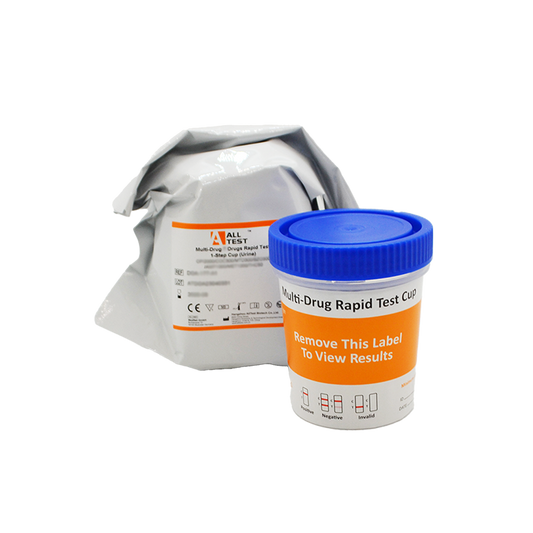Quick Summary - Testing for Nitrous Oxide (Whippets)
There is no home test for nitrous oxide abuse, however we can test for the 4 most common substances frequently abused alongside nitrous oxide (whippets) (Ketamine/Cocaine/Cannabis/MDMA) these party drugs are often coupled with whippets for an enhanced feeling.

Urine Drug Test Multi Panel (Party)
From £2.80 GBP
Is Nitrous Oxide Considered A Drug?
Yes, nitrous oxide is a short-acting drug, often referred to as Hippy crack. One key question to consider is, is nitrous oxide a gateway drug? We would argue, certainly. While nitrous oxide itself has relatively short-lived and mild psychoactive effects compared to more potent substances, its use can be indicative of a larger pattern of behaviour associated with recreational drug experimentation. Users often seek out nitrous oxide due to its ease of access and perceived lower risk, but this initial experience can open the door to the exploration of other, more dangerous substances. This pattern is particularly concerning among young people who may first encounter nitrous oxide at social gatherings or parties, associating drug use with a low-risk recreational activity. The normalisation of using nitrous oxide in such environments can lead individuals to develop a mindset that desensitises them to the risks of experimenting with more harmful drugs. This slippery slope effect is why some experts classify nitrous oxide as a potential gateway drug.
What is Nitrous Oxide?
Nitrous oxide (N₂O) is a colourless, non-flammable gas with a slightly sweet taste and smell. It’s primarily used in dentistry and surgery for its anaesthetic properties, as well as in the food industry, notably as a propellant in whipped cream dispensers. When used recreationally, people inhale nitrous oxide from balloons or canisters (referred to as “whippets”) to experience brief feelings of euphoria, lightheadedness, and, for some, hallucinations—a state often described as “getting high.”
However, this high is short-lived and can lead to a craving for repeated use. Over time, chronic misuse can cause more severe side effects, such as nerve damage, memory loss, and in extreme cases, oxygen deprivation leading to death. In response, the UK classified nitrous oxide as a Class C drug in 2023. But will this legislation effectively reduce its widespread abuse?
Historical Ease of Access
Nitrous oxide has been easily available for decades due to its widespread legal uses. Small canisters, known as “whippets,” are sold in bulk for catering purposes and were often sold with minimal restrictions online or in convenience stores. The ease of access, combined with the low cost, made it a popular substance, particularly among young people and those attending music festivals.
In the UK, nitrous oxide became the second-most commonly used drug by people aged 16 to 24, according to the Office for National Statistics. The sheer availability and legal gray area around nitrous oxide use made it difficult to curb its recreational appeal.
Effects of Nitrous Oxide Use
The effects of nitrous oxide can vary depending on the amount inhaled, frequency of use, and individual susceptibility. Common short-term effects include:
- Euphoria and giddiness
- Altered perception of time and space
- Fits of laughter (hence the name “laughing gas”)
- Dizziness and lightheadedness
However, these effects come with risks, especially with regular or heavy use. Prolonged exposure to nitrous oxide can lead to more severe consequences, including:
- Vitamin B12 deficiency (leading to nerve damage)
- Cognitive impairment and memory loss
- Fainting or falling due to lack of coordination
- Oxygen deprivation, which can result in unconsciousness or, in rare cases, death
The ease of accessibility and the perception that nitrous oxide is “safer” than other substances has contributed to its popularity. This perception has made regulating the substance a priority for lawmakers, but the challenge lies in finding the balance between legitimate use and preventing recreational abuse.
Comparing Nitrous Oxide Use: UK vs. USA
In both the UK and the USA, nitrous oxide has grown in popularity as a recreational drug, but there are notable differences in how the two countries handle its regulation.
- UK: Until recently, nitrous oxide was largely unregulated for recreational use. The 2016 Psychoactive Substances Act sought to make it illegal to supply the gas for its psychoactive effects, but loopholes in the law meant that people could still obtain it for catering or medical uses without much oversight. This led to the substance remaining widely available despite efforts to curtail its use.
- USA: In the United States, nitrous oxide is regulated under the Controlled Substances Act, but the rules vary by state. Recreational use is illegal in most states, yet enforcement of these laws is inconsistent. Similar to the UK, whippets are sold for legitimate uses, but the widespread availability and lack of stringent penalties make them easy to obtain for recreational use.
Interestingly, nitrous oxide has taken on a new form in the U.S. under the branding of “galaxy gas,” which is marketed as a legal substance for recreational use at parties. Galaxy gas comes in colorful canisters, appealing to younger audiences, and its rise has drawn concerns about glamorizing the drug for recreational purposes. The trend of galaxy gas hasn't taken root in the UK to the same extent, but its growing popularity in the U.S. points to the risks of normalizing nitrous oxide use under flashy marketing tactics.
The New UK Law: Will It Actually Work?
In 2023, the UK government took a more stringent approach to regulating nitrous oxide. The new law made it illegal to possess nitrous oxide for recreational purposes, and stiffer penalties were introduced for those caught supplying or using it for non-legitimate reasons. The aim is to prevent the widespread abuse of nitrous oxide, especially among young people.
However, questions remain about the effectiveness of this law:
- Black Market Potential: When legal access to substances is restricted, black markets often thrive. Dealers could exploit the high demand for nitrous oxide, leading to unsafe, unregulated sales.
- Price Impact: With tougher laws, the price of nitrous oxide is expected to increase, potentially making it less accessible to casual users. However, this could also make it a more lucrative market for illegal suppliers, akin to what happens with other banned substances.
- Ease of Online Sales: Regulating online sales has always been tricky, and despite the new law, nitrous oxide can still be purchased online with relative ease. This could undermine efforts to curb its use.
- Enforcement: Enforcing this law poses significant challenges. With legitimate uses still in play, ensuring that recreational use is distinguished from legal use will require resources and focus that may stretch local law enforcement.
Testing For Nitrous Oxide-is there a drug test to detect nitrous oxide use
There is currently no way to test for nitrous oxide abuse as the effects are so short, however using nitrous oxide is gateway into other drugs such as ketamine and cocaine, which are often combined with the use of whippets at social events to enhance the effects and provide a more overwhelming descent. Therefore if you believe someone to be partaking in nitrous oxide abuse, you should take preventive measures such as drug testing for other common party drugs, including cocaine, ketamine and cannabis.
The UK's crackdown on nitrous oxide reflects growing concern about its recreational use, particularly among young people. While the new law is a step in the right direction, its effectiveness will largely depend on enforcement and the ability to cut off illegal supply chains. The comparison to the USA, particularly with the rise of galaxy gas, shows how creative branding can circumvent regulations, making it crucial for the UK to keep a watchful eye on new trends.
Ultimately, education about the risks of nitrous oxide, alongside legal enforcement, will be vital in reducing its abuse. Reducing demand through awareness could be just as important as curbing supply, and perhaps more effective in the long term. Whether the UK can successfully manage the balance between legitimate and recreational use of nitrous oxide remains to be seen.





